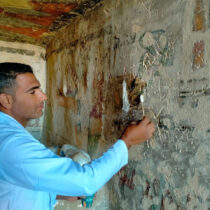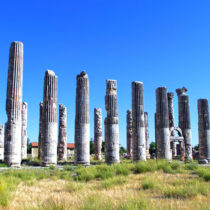“I heard one man say, ‘Beat her and take her camera,’ ”. As the men phoned for police, she hid her camera’s memory card in her shirt. After 45 minutes of argument, she was allowed to leave.
This is how archaeologist Dr. Monica Hanna describes an incident that happened during her work, which involves documenting lootings at several archaeological sites.
An Egyptian national, with a Bachelor’s degree from the American University in Cairo and a PhD from the University of Pisa, Italy, – and now a post-doctoral scholar in Humbolt University, Berlin- Dr. Hanna represents a group of young, hopeful and inspired Egyptian archaeologists who happened to live in “interesting times” for their country and proceeded to do their best, protecting what they love most: Egypt’s cultural heritage.
Hanna, 30, is a leader in exposing the antiquity-looting that has exploded since Egypt’s 2011 revolution. She appears on Egyptian television debating government officials, takes reporters to looted sites, and encourages Egyptians to protect their heritage. She now works with three groups to monitor archaeological sites; a website will allow people, including tourists, to anonymously report damaged antiquities.
According to Nigel Hetherington, an archaeologist and co-founder of Past Preservers, a media firm connecting archaeology and the wider public, Hanna, among other Egyptian archaeologists, “brings a model of archaeological heritage-management that is severely lacking here … (she) can empower the younger generation to take control of this mess.”.
Still, this attempt doesen’t come without a cost.
“The locals, who are a part of the looting, don’t want the photos out there because then their business stops,” Hanna explained. She often receives threatening phone calls: “People say that I am foreign-paid, that I have a foreign agenda, or that I am doing this for personal glory.” A policeman told her uncle that she should stop because “she is bothering really big people.”
Salima Ikram, Hanna’s former teacher and head of American University’s Egyptology unit, is not surprised by the threats: “That means she is doing her job well. She is scaring some of the syndicate people who live around and feed off of the antiquities.”
Hanna concedes she may be risking her career: “I might not get future permits to work on archaeological sites from the antiquities ministry. But, then, it’s ethics versus career — if I cannot talk about this, then I really have no place to teach my students one day that we have done our best to protect our heritage.” Her commitment arose, she said, because foreign archaeologists were afraid of losing work permits if they spoke up and antiquities inspectors who reported looting were usually ignored.
“If we Egyptians don’t protect our heritage, who will?” she asks.




